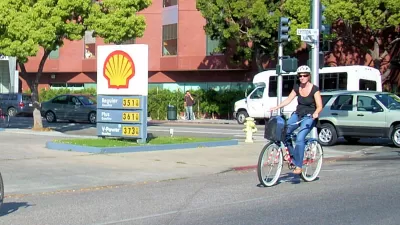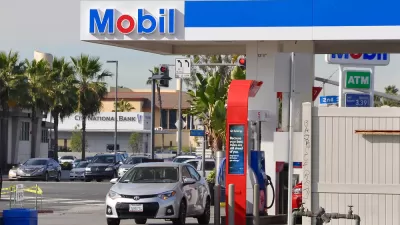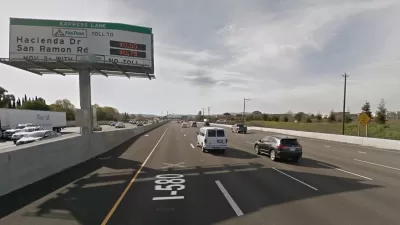Even if newly revised transportation legislation supported by Gov. Jerry Brown and Democratic leaders to raise fuel taxes and fees should pass into law, the funding mechanism may not prove sustainable in the long term.
Melody Gutierrez of the San Francisco Chronicle reports on the formidable challenges facing backers of the revised gas tax legislation ahead of the state Senate vote on April 6:
Brown and legislative leaders imposed a Thursday deadline because they want the vote taken before lawmakers return to their districts for the weeklong spring break. That’s when legislators are more likely to hear from voters about the unpopular gas tax and higher vehicle registration fees that are part of SB1.
Yet even if all 27 Democrats, composing a supermajority of that chamber, vote for it, and, for argument's sake, went on to passage, California's long term transportation funding crisis would persist. Simply put, fuel taxes, which supply most of the state's transportation funding, may simply be a losing proposition for a state that has mandated a steep reduction in greenhouse gas emissions. That's the focus of an article by Meghan McCarty, commuting and mobility reporter for Southern California Public Radio, KPCC.
The state has a $130 billion backlog in needed road repairs. Even if the gas tax is increased and tied to inflation, as proposed, the funding gap could persist if cars continue to become more fuel efficient or go electric, which will mean people driving farther while buying less gas.
As posted shortly after Gov. Brown's inaugural address in 2015, the solution to the conflicting environmental and transportation funding goals may lie with the Road Charge Pilot Program that launched last July. McCarty continues:
I am participating in the pilot and using [a small device plugged into my car’s computer through the On-Board Diagnostic port], which also helps improve driving performance and car maintenance by monitoring the engine and battery, how fast I'm driving and how I apply the brakes.
Courtesy of KPCC: KPCC's transportation reporter, Meghan McCarty, shows the mile-tracking device she's using in her car as part of a Caltrans pilot program testing per-mile charges versus taxes at the pump. SANDRA OSHIRO/KPCC [Also see, "Technology Companies Selected for California Road Charge Pilot," March 20, 2016.]
However, the road usage charge comes with its own flaws, and I'm not just referring to the privacy issue, which turns out to be overrated. Research last year by Indiana University's School of Public and Environmental Affairs (SPEA) found that "[o]pponents of mileage user fees exceed supporters by a 4-1 ratio." Even more disturbing were the other findings their survey found about user fees in general:
The survey indicated that roughly two-thirds of Americans do not believe roads should be financed under the user-pays principle, whether that’s through a fuel tax or mileage fee.
“It will also take political courage to support a mileage user fee,” said SPEA researcher Denvil Duncan, the lead author of the study. “The political gamesmanship that often surrounds tax policy reforms is likely to favor opponents.”
==============================================================================
Related in Planetizen:
-
Gov. Jerry Brown and State Democratic Leaders Agree on Gas Tax Deal, April 3, 2017: Revised transportation funding legislation is needed to meet California's ballooning infrastructure deficit, but it needs a supermajority to pass, and it contains a fatal flaw for clean air activists.
-
Will California's Road Charge Fix California's Transportation Funding Shortfall? August 9, 2016: California began the Road Charge Pilot Program on July 1 to see how participants would respond to being charged by the mile driven rather than by gallons of fuel consumed. Participants may now have received their first 'mock' invoices.
-
California Committee to Consider Road User Charge, January 26, 2015: Gov. Jerry Brown has an environmental goal that conflicts with an infrastructure goal: reducing oil consumption and raising funds to pay for deferred road needs. The solution may be the Road User Charge, which lies in the hands of a new committee.
Hat tip to AASHTO Daily Transportation Update.
FULL STORY: California asks: Fix roads by taxing miles instead of gas?

Planetizen Federal Action Tracker
A weekly monitor of how Trump’s orders and actions are impacting planners and planning in America.

Maui's Vacation Rental Debate Turns Ugly
Verbal attacks, misinformation campaigns and fistfights plague a high-stakes debate to convert thousands of vacation rentals into long-term housing.

San Francisco Suspends Traffic Calming Amidst Record Deaths
Citing “a challenging fiscal landscape,” the city will cease the program on the heels of 42 traffic deaths, including 24 pedestrians.

Defunct Pittsburgh Power Plant to Become Residential Tower
A decommissioned steam heat plant will be redeveloped into almost 100 affordable housing units.

Trump Prompts Restructuring of Transportation Research Board in “Unprecedented Overreach”
The TRB has eliminated more than half of its committees including those focused on climate, equity, and cities.

Amtrak Rolls Out New Orleans to Alabama “Mardi Gras” Train
The new service will operate morning and evening departures between Mobile and New Orleans.
Urban Design for Planners 1: Software Tools
This six-course series explores essential urban design concepts using open source software and equips planners with the tools they need to participate fully in the urban design process.
Planning for Universal Design
Learn the tools for implementing Universal Design in planning regulations.
Heyer Gruel & Associates PA
JM Goldson LLC
Custer County Colorado
City of Camden Redevelopment Agency
City of Astoria
Transportation Research & Education Center (TREC) at Portland State University
Jefferson Parish Government
Camden Redevelopment Agency
City of Claremont






























